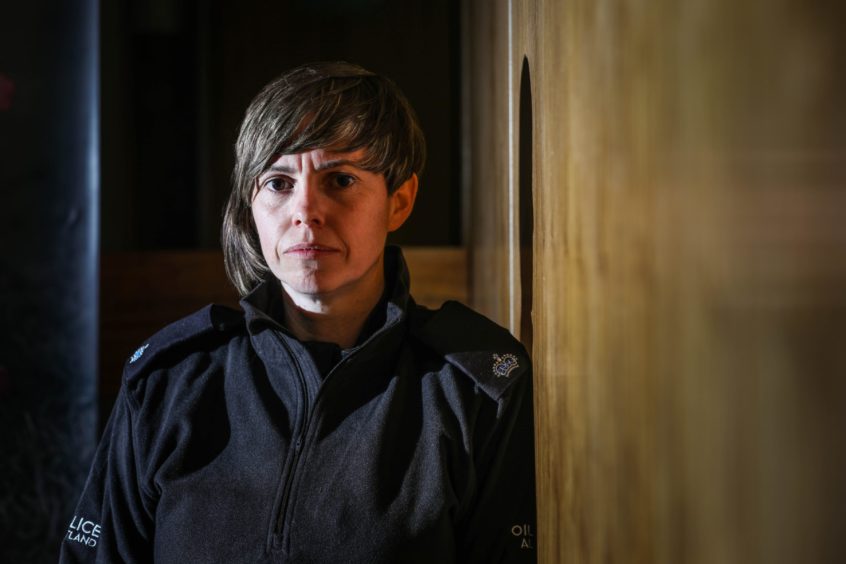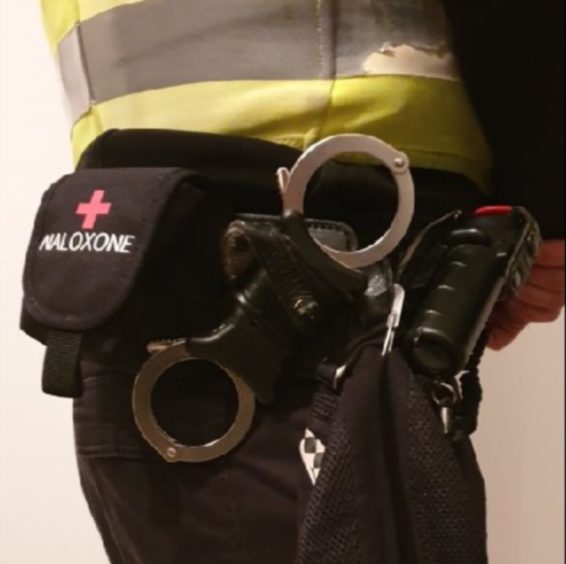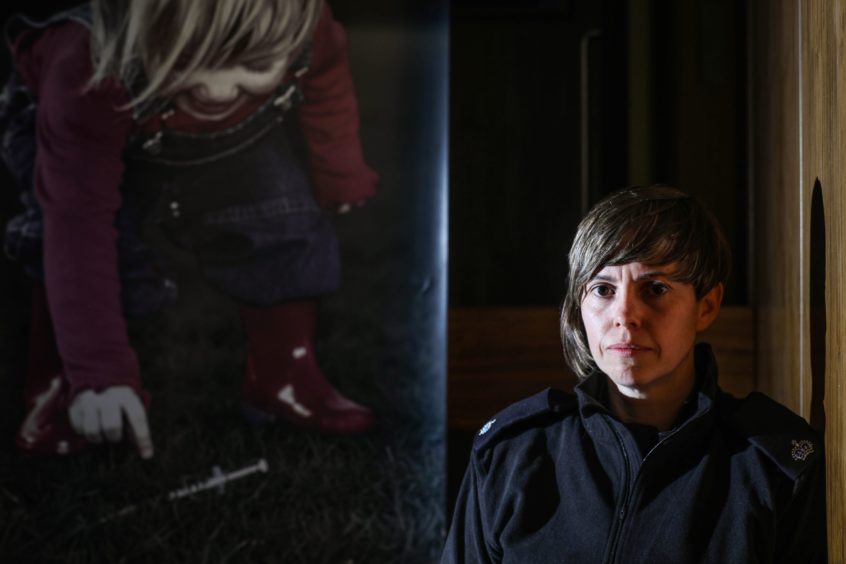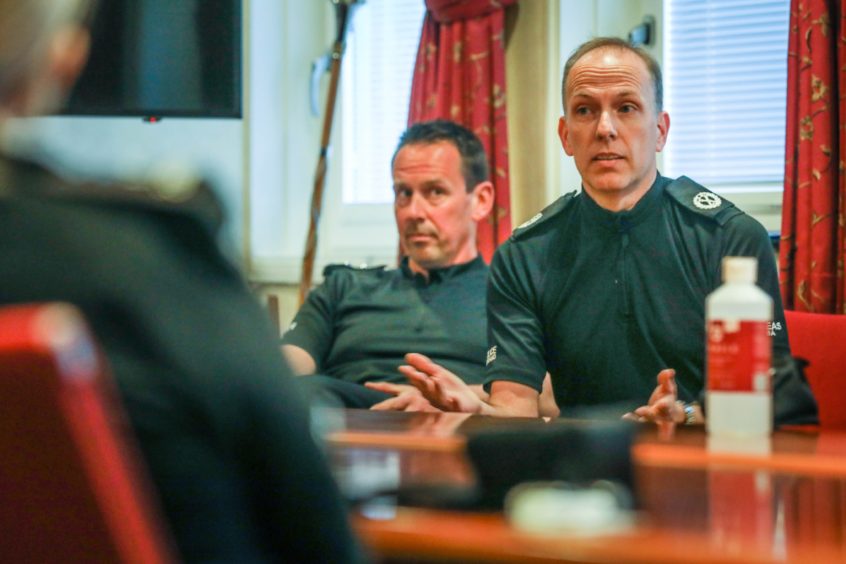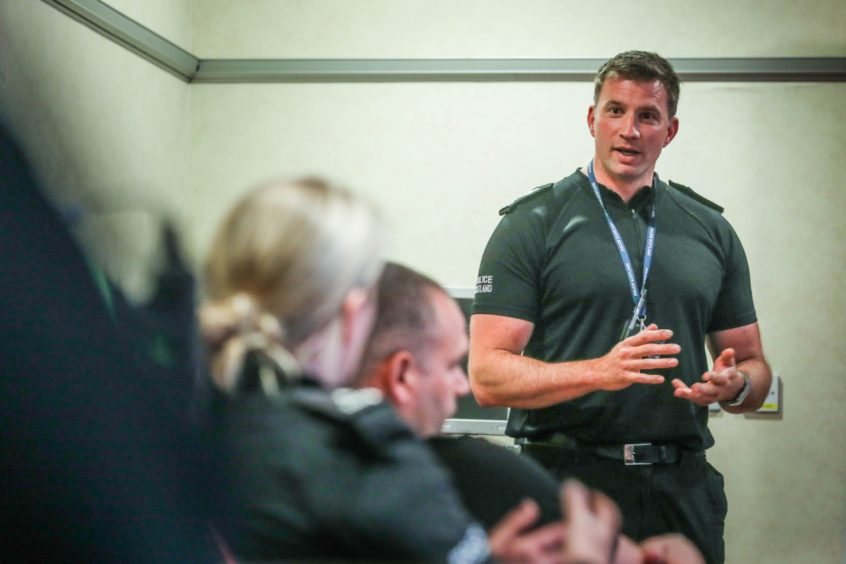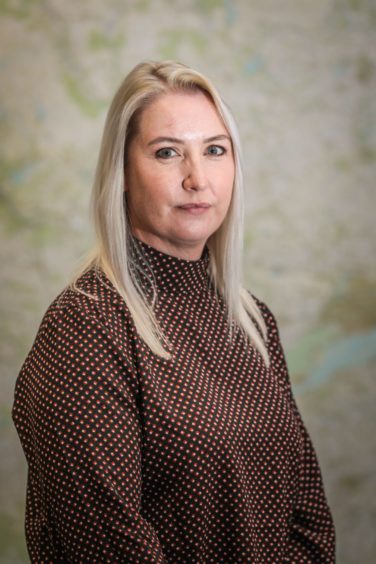Police in Dundee who are trialling the use of Naloxone have already used it to save someone overdosing on drugs.
A pilot scheme has been launched in three local policing sub-divisions across Scotland, with Dundee officers given the option to carry the nasal spray, which reverses the effects of an overdose from opiate drugs such as heroin.
The scheme began three weeks ago in Dundee, and is voluntary during the pilot, with officers asked to make their decision having completed a training course. Since then at least one person overdosing on drugs has been given Naloxone by an officer in Dundee.
It has also been used by officers in the other trial areas of Greater Glasgow and Falkirk.
Pilot scheme
Police are issued with a personal Naloxone kit, to be worn on their utility belts, if they wish to be part of the pilot, which is called a ‘test of change’.
The pilot was approved last year as part of the national public health approach to tackling the impact of drugs, led by the Scottish Drugs Deaths Taskforce, which is funding the supply of the drug.
The taskforce was established in July 2019 by the minister for public health and sport and the cabinet secretary for justice, to tackle the rising number of drug deaths in Scotland.
Its primary role is to “coordinate and drive action to improve the health outcomes for people who use drugs, reducing the risk of harm and death”.
We attended one of the training sessions at West Bell Street Police Station in Dundee, and spoke to people involved, including Superintendent Nicola Russell.
She said: “Naloxone is used in all opiate overdoses, and ultimately what it does is reverse the effects and hopefully brings the person round from that overdose.
“Dundee has been chosen as one of the pilot cities. We do have a high level of drug overdoses in the city, and we actually have a lot of partners who already carry Naloxone.
“This is just us being part of that partnership approach, to try and save people’s lives, basically.”
Supt Russell said partners in the third sector who support people at risk of opiate overdose, such as drug support services, already provide Naloxone. Other agencies including the Scottish Prison Service already encourage people to carry it as well, she said.
Nasal spray
Discussing the training for police officers, she said: “They are being trained ultimately as to how to administer it.
“It’s a spray that goes up somebody’s nose, if they’re in that overdose state, and it’s a squirt that then brings them out of that overdose.
“This is a pilot across the country and the purpose of that is to have that reviewed and analysed at the end, to see what the benefits of us carrying it are. Ultimately, Police Scotland will then make a decision as to whether all officers will carry it.
“But for us at the moment, it’s optional, so the officers are being given the choice as to whether they wish to carry it or not.
“The role of a police officer is to help someone, ultimately we are about keeping people safe.
‘Help someone in their darkest moment’
“In order to do that, we will ensure that we supply various different first aid, and this, for me, is just one of those first aid techniques, that can help somebody when they’re in their darkest moment.”
Three weeks after the pilot launched, Supt Russell said 87% of officers in Dundee had chosen to take the training.
She added: “If this saves one life in the city then I think it’s been worthwhile. If officers are carrying it, it gives them the option, if they come across somebody that’s in an overdose, the option to actually administer it.
“If they’ve got it on them they don’t need to wait for the ambulance to turn up.”
Public health emergency
Drug deaths in Scotland have been classified as a public health emergency.
The most recent National Records for Scotland drug-related deaths statistics showed 1,264 drug-related deaths in 2019, an increase of six per cent on the previous year.
The total is the most drug deaths recorded since 1996, with 72 of those in Dundee.
The City of Discovery has the highest rate of drugs deaths in Scotland, at 482 per million people.
Dundee ‘a city that tries things’
Gary Ritchie, Assistant Chief Constable for partnerships, prevention and community wellbeing for Police Scotland, said he hoped that Naloxone would be carried by officers across Scotland, if the pilot scheme indicated it would be worthwhile.
He said: “There are some really good partnerships already in Dundee. As we know, it’s the City of Discovery, but it is a city that tries things, it’s a city that isn’t scared to break out from normal ways of doing things to try and help.
“There’s a lot of good, strong partnerships between the police, health and support agencies already, in respect of people who are living with addictions, so that was our main draw here.”
When asked if this could become standard for officers across Scotland, he said: “Well I hope so, and this is what the test of change is about. It’s about building that evidence base that doesn’t exist at the moment, to see whether or not this can help.
Saved seven people’s lives already
“We’ve only been doing [the Naloxone pilot across Scotland] for five weeks and there’s already been seven occasions where we’ve actually used Naloxone and helped saved somebody’s life, so that’s an early indication.
“If it all turns out positive and we’ve shown to make a difference then that’s the recommendation that I’ll make, that we should.”
Discussing the fact that so early into the pilot, officers had used the kits, he said: “It proves that police officers find themselves in situations where they can make interventions that will help people.
Scotland’s 1,264 drugs deaths in 2019
“All we’re doing is offering a better piece of first aid kid, that’s actually going to be safer, easier to use and more effective in respect of opioid overdose than any other first-aid technique that they could use.
“So there’s an early indication of the value I think, and it perhaps just shows that it’s right that we’re doing this; it’s a valid test of change.”
When asked if Dundee’s well-documented drugs problem and high substance-related deaths were a factor in it being one of the areas chosen, he said: “There were 1,264 drugs deaths throughout Scotland last year.
“The drugs deaths problem doesn’t centre around one city or area, it’s all across the country. We could have gone to any area and I think it would have had similar value.”
He added: “The feedback has been overwhelmingly positive. It’s a free choice for officers, so we give them the training, we give them the input, we answer the questions and concerns that they may have, and they get to choose whether or not they want to take part in the test of change.
‘It’s about saving lives’
“Overall, about 75% of the officers have chosen to take part, and I think that’s probably because this speaks to what it is to be a police officer. At the end of the day, it’s about saving lives, about helping people when they’re at their worst moment.
“So, it was always my thought that police officers would be keen to be involved, and I’m delighted to say that’s how it’s looking.”
ACC Ritchie said some of those who hadn’t taken part may have decided not to as they felt it was breaking away from the usual duties of a police officer, by administering a medicine.
‘A cultural revolution’
“It’s not about being revolutionary towards policing, it’s about creating a revolution in this country, whereby we don’t have over 1,200 people dying from drug overdoses every year,” he said.
“It’s a small part of that. This is not, on its own, going to do that, but the fact that police are stepping up, willing to be part of that public sector response to this, I think is far more important.
“And that’s what we want to see; a cultural revolution where we don’t see so many people dying of drugs overdoses.”
‘Great news’ but lots more to do
Kirsten Horsburgh, strategy coordinator for drug death prevention with the Scottish Drugs Forum, also attended one of the training sessions in Dundee.
She said: “The Scottish Drugs Forum has been advocating for many years for police officers to be involved in the carriage of Naloxone, because we knew, anecdotally, that police officers were often at the scene of an overdose, and were in a perfect position to administer Naloxone, and potentially save someone’s life.
“So, we were delighted to be able to help push that through with the Drug Deaths Taskforce, and with Police Scotland, so, great news.
“I think one of the issues in the early days was the fact that we only had an injectable product of Naloxone, so we only had intermuscular Naloxone. That was an issue for police because it’s new to them anyway, carrying a medication for this type of purpose.
“When we got the intranasal Naloxone licensed in Europe, that really opened up a new opportunity for us to be able to work with police, using a different product, that didn’t pose the same kind of concerns that they had around carrying needles and giving injections, so that was a gamechanger, really.
“Our ambition is that anyone likely to witness an overdose should be carrying Naloxone, and that should be much more widely distributed across Scotland in general.
“At the moment, the majority of people who carry it are people who use drugs themselves, because that’s always the priority of the programme. They’re most likely to witness an overdose.
“Family members, friends, staff working in drugs services, and any other organisations and services that are commonly in a position where they might witness [an overdose] and police fit clearly into that criteria.
“So yes, it’s always been our ambition that we would see Naloxone use more widely spread from Police Scotland, and in custody centres.”
‘Unimaginable trauma’
Ms Horsburgh said that generally, the Naloxone pilot had been positively received by people taking part.
“We know that there’s been a really good uptake so far of Naloxone by Police,” she said.
“But a lot of the time when you’re delivering the training, you’re really trying to address some of the underlying issues as well. So police quite often are commonly seeing people who are at their worst.
“Trying to get police to see people through a trauma lense as well. A lot of people that they are dealing with will have had history of unimaginable trauma, poverty, deprivation in their lives.
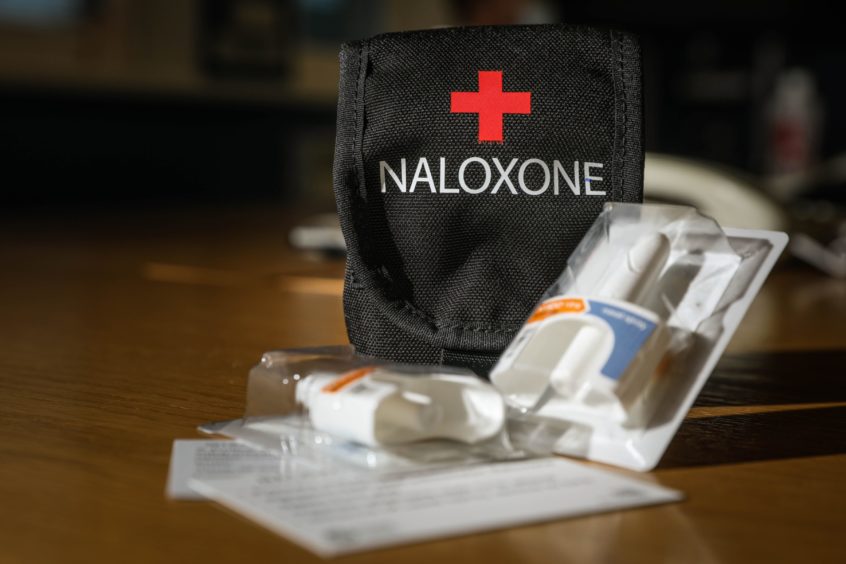
“They were once a young person with ambitions, hopes and dreams, and now could potentially be in a position where they are experiencing extremely difficult drug problems. And they’re not often given the support and help that they need.
“So, there’s a lot underlying which needs to be addressed, and I think this is one step towards that.”
Addressing stigma
She added: “It’s never been discussed that in order to address this major public health emergency that we have, in relation to drug deaths, is that all we need to do is supply police with Naloxone, and that will solve the issue.
“This is a really important project, but it’s part of a much bigger picture and a much bigger requirement for everybody to take ownership of the situation.
“So, we need massive improvements to our treatment services, we need better responses to near-fatal overdoses, we need much more choice for people in relation to their treatment choices, and we need to absolutely address stigma.
“You’re limited to that when you’re working under a picture of people being criminalised for their drug use. So, there are major drug policy changes required in order to address the problem.
“This is an important part of it, but definitely not the solution.”
Preventing the death of a person
One of the Dundee officers who completed the training, Sgt Karen Judge, said she was happy to take part in the trial, but hoped it wasn’t something she would have to use regularly.
She said: “I was interested in finding out how we were going to administer Naloxone, because historically it’s been an injection, and see what we were expecting our officers to carry.
“Also, we are going to drug overdoses, drug deaths, quite a lot in our service. It’s not a daily occurrence but it’s getting that way.
“I’m willing to put myself forward for anything that’s going to prevent the death of a person.”
‘Dying at my feet’
She added: “The information was factual, any questions or queries the officers had were answered. I’ve got no issues with it – for me, it’s a first-aid mechanism.
“I think we’re hoping it’s not something we’re really going to have to use regularly, but I think most people are happy that we’ve got that tool there.
“I’d rather be faced with saving someone’s life and waiting for an ambulance, rather than them just dying at my feet.”
